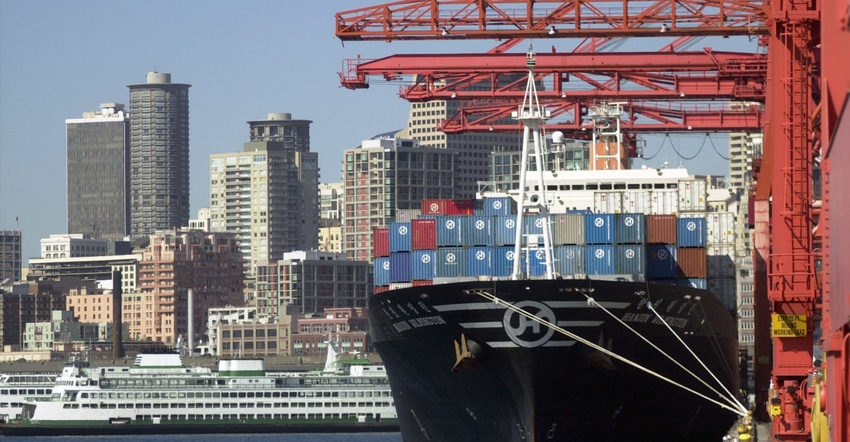New 49-acre “pop up” site in Port of Seattle to provide staging ground storage for both dry and refrigerated containerized ag goods.

As part of USDA efforts to assist with port congestion, Secretary of Agriculture Tom Vilsack announced plans March 18 to reposition containers of agricultural goods near port terminals to help improve service for shippers of U.S. grown agricultural commodities.
USDA is partnering with Northwest Seaport Alliance to enhance access to a 49-acre “pop up” site to accept either dry agricultural or refrigerated containers for temporary storage at NWSA in Seattle to reduce operational hurdles and costs, making it so they can more quickly be loaded on ships at the export terminals. The NWSA includes the marine cargo operations of the ports of Seattle and Tacoma and is the fourth-largest container gateway in the United States.
Congestion-induced impacts to vessel schedules and prioritization of returning containers empty to Asia have significantly raised barriers for exporting agricultural products in containers, resulting in lost markets and disappointed customers. NWSA has seen a nearly 30% decline in the export of agricultural commodities in the last six months of 2021 and the ratio of loaded versus empty container exports has shifted to predominately empty containers since May 2021, USDA says.
Vilsack says this administration is calling out ocean carriers that are taking advantage of the situation to leverage undue profits and are treating U.S. agricultural companies and producers unacceptably. “That is why we are using creative approaches to improve port operations while elevating American-grown food and fiber,” he says.
The dairy industry has been outspoken with its concerns of port congestion as dairy products have faced significant delays and canceled orders.
Krysta Harden, president and CEO of U.S. Dairy Export Council, says, “Dairy farmers and manufacturers celebrate today’s great news of an additional ‘pop-up’ site focused on helping to deliver relief for U.S. agricultural exporters grappling with severe supply chain challenges. This will provide meaningful assistance in getting their high-quality products to overseas customers. We appreciate Secretary Vilsack’s focus on continuing to find additional ways to tackle this concern.”
FSA to make payments
USDA’s partnership with the NWSA’s existing near-dock facility at Terminal 46 in Seattle is part of the administration’s Supply Chain Task Force efforts with state and local governments and builds on earlier efforts. USDA’s efforts to increase capacity at the NWSA follow the department’s announcement on Jan. 31, 2022, of a similar partnership with the Port of Oakland in California, and a U.S. Department of Transportation partnership with the Port of Savannah in Georgia.
USDA continues to seek opportunities to partner with additional ports or other intermodal container facilities to help American farmers and agricultural producers move their product to market and manage the short-term challenges while pressing the ocean carriers to restore better levels of service, USDA says.
Through the use of Commodity Credit Corporation funds, the Farm Service Agency will make payments to agricultural companies and cooperatives that position containers filled with American-grown agricultural commodities at the “pop-up” temporary site at the Port of Seattle. Specifically, FSA payments of $200 per dry container and $400 per refrigerated, or reefer, container will help cover additional logistical costs.
The sign-up will be streamlined through a central application process with the details available in a Notice of Funding Availability that will be published in the coming weeks. Payments will be made in arrears and verified with the pop-up terminal records, USDA says.
Momentum building on further action
In announcing the new pop-up site at the port, Vilsack was joined by Stan Ryan, president and CEO of Darigold, who is also a National Milk Producers Federation and USDEC member and a driving force behind the supply chain improvement.
Harden and NMPF President and CEO Jim Mulhern say the announcement coupled with momentum building on the Ocean Shipping Reform Act brings cause for optimism. The Senate may advance the bill next week that includes provisions to hold shippers accountable to the Federal Maritime Commission.
“We’re thankful to Secretary Vilsack for his leadership on this topic that’s so crucial to dairy,” Mulhern adds. “We urge the administration to build on today’s great news by expanding further to inland locations as well.”
NMP also urged Congress to move forward swiftly with legislative solutions to the supply chain crunch by passing the Ocean Shipping Reform Act. The House passed the bill last year. During a Problem Solvers Caucus meeting on Thursday afternoon, lead authors of the act including Rep. Dusty Johnson, R-S.D., says the House bill is more descriptive than the Senate’s version, but they’re willing to negotiate on differences if the Senate can get the bill across the finish line in that chamber.
“There are no red lines,” he says of changes that would derail the bill if it can get to conference. “The bottom line we do not want to turn this into a Senate versus House.
“We’re going to fight for our preferences, but we’re going to get something done,” Johnson says.
About the Author(s)
You May Also Like





